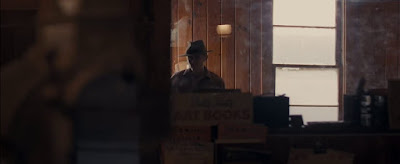Dear Ruth
or
"Goin' a direction that ain't been invented yet."
David Lowery's independent study of love on the run, Ain't Them Bodies Saints, is a romantic's view of criminal activity in the same spurting vein as Bonnie and Clyde, Badlands, and Thieves Like Us, where the romantic glow of need and obsession have a tendency to blind a body from the rest of the world and what's considered normal.
Ruth Guthrie (Rooney Mara) and Bob Muldoon (Casey Affleck) are young and in love, and Bob's in the employ of Skerritt (Keith Carradine), who runs a hardware store in town, but a has a nice little underground thievery ring keeping it afloat. Bob and Freddy (Kentucker Audley—what a great name) do the deeds, then run back to the abandoned farm that was their grandfather's before it went bust to hide out and wait for Skerritt's pay out. But, when we first meet them, Ruth and Bob are young, in love, spatting, she's pregnant and practical, and he's a moony-goony kid with nothing going for him in the long term.
Except for the prison sentence. The cops get wind of where the outlaws are hiding, and it looks like it's going to be one of those barn-burners where everyone gets killed. Freddy dies first, then Ruth shoots Officer Patrick Wheeler (Ben Foster), and Bob devises that he'll say he shot Wheeler, so that Ruth can go free, he'll take the prison stretch, and he'll come back to his family when his time is up.
Best laid plans.
Ruth has her child, a girl, which Bob finds out about in prison, but he's not the the practical one—he's the impulsive one—and before long he's on the run with five other prisoners, presumably to get back with his family. The police and Skerritt are both on high alert, figuring that they know that Bob's headed in their direction. But a lot has changed. Skerritt proves he has a conscience by setting up Ruth and her child in a place (across the street from him, so one wonders if the reason is totally altruistic or simplified reconnaissance). And Wheeler starts calling on Ruth, ostensibly to see if she knows anything about Bob's whereabouts, but also because he finds he starts to have feelings for her, not knowing that she's the one who shot him, and not knowing that she knows.
Where Lowery excels, though, is (with cinematographer Bradford Young) in creating beautiful images—again, out of pretty mundane things—and letting those images tell the story (it has to, the reason being that the dialogue is useless, except to let you know that everybody's lying and/or hiding something) and that's a considerable challenge for someone's first feature. Those issues also complicate the acting, but between Affleck, Mara, and Foster, you have three excellent actors who acquit themselves at playing "opaque." Keith Carradine (who starred in Thieves Like Us, by the way), though excellent, is a little more obvious in his intentions, although he's an actor who can apply both comedy and drama masks to his face.
It's an interesting study and makes one wonder what other subtle things Lowery is capable of pulling off.







No comments:
Post a Comment